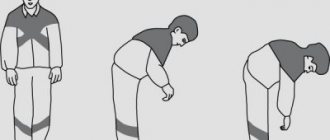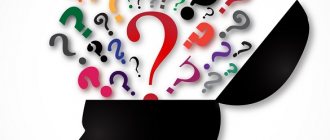Insight is a special ability
An insightful person is one who is able to foresee upcoming events, has the ability to make the right conclusions in a certain situation and make the only correct decision at the appropriate moment.
Human insight is a unique ability that all inhabitants of our planet would like to have. This is an opportunity to see the real state of things, hidden behind many subjective factors of human life. We can say that insight is an objective attitude to the situation, which makes it possible to accurately predict future events, based only on your knowledge of what is happening.
But what does it mean to be a “discerning person”? This is a person who can easily determine the hidden essence of things, actions, events and people.
The important thing is that this is a calm individual who does not pay attention to external signs and behavior of other people. For him, it is not at all important whether a person has wealth or lack thereof. Only thanks to his inner instinct, based on his impressions, relying only on his inner self, he can achieve success in almost any area of life, finding the only correct action in any situation. This is what it means to be an insightful person!
A person can hardly control the manifestations of non-verbal communication: it is given to us by evolution. But not all interpretations are correct. For example, crossed arms can mean both rejection and that the person is cold. Context is always important. “Nevertheless, the legs and eyes never lie,” says psychologist Vladimir Svoboda.
iDnes: Why do we read manifestations of nonverbal communication mainly subconsciously?
Vladimir Svoboda: During evolution, the expression of our eyes and faces developed in the conditions of interaction between ancient people. Ancient hunters could not call each other during the hunt, and they had to “agree” with their gaze, on which the survival of the entire community depended. The expression of stress on the hunter's face and body language served as a signal to the others of approaching danger. Today we continue to use this important ability, for example, in work environments. This mechanism is intended for better socialization and social exchange. Of course, our ability to read other people's stress varies. But in general we can say that women are more susceptible to stress and related nonverbal communication.
- Why?
- That’s how it is by nature. For the first three years of life, the child does not speak, and the mother must recognize by the baby’s gaze when he is hungry or in pain, because the child does not always express his desires by crying. Of course, this method is easier for a child, but 80% of communication between mother and child takes place at the level of gaze. That's why vision has evolved the way it has, and that's why we call it the main channel of nonverbal communication. Touch, taste, hearing and smell account for only five percent each. And the eyes not only perceive information, but also send it back.
- How?
Chief editor 05/21/2019 BBC Russian service 06/08/2014
“During the course of evolution, it turned out that when our pupils constrict, we sense danger. So when we look at something we can't stand or hate, we react by constricting our pupils. They can shrink or increase as much as four times. Depending on their size, you can understand whether the other person is happy to see you or not. On the contrary, when the pupil is dilated, you feel relaxed, and this is also one of the signs of sexual interest. But we do all this unconsciously, and the oldest part of our brain, called the amygdala or amygdala, is responsible for this.
- Can you rely on such things?
— Of course, everything always depends on the context. For example, lighting plays a role, to which the pupils also react. Eyes are monitored, for example, in criminology during interrogations. Renowned expert Joe Navarro, the most decorated FBI agent, has long studied the behavior of human eyes, including eyebrows, the area under the eyes, wrinkles and eyelids, which, by the way, can occupy thirty-five positions. Based on the data collected, he formulated a theory of interrogation techniques with an emphasis on the eyes.
He gives the example of a woman who came to the police to report her daughter missing. At the police press conference, dozens of cameras were filming her, and FBI agents drew police attention to movements in the mother's eyes, eyebrows and eyelids that suggested she was not telling the truth. The woman portrayed crying, suffering and deep emotions, but at the same time “didn’t raise an eyebrow.” Although when you cry or hold back your crying, these two wrinkles always form above your eyebrows. And she wiped her eyes with a paper handkerchief, choked out tears, but the skin around her eyes did not move. On the contrary, when she talked about her missing daughter, her pupils shrank every time. In the end, it turned out that the mother killed her daughter because her partner could not stand the girl.
— What are the consequences from the point of view of nonverbal communication of wearing masks and covering most of the face?
- To a greater degree of uncertainty. Because masks hide more of our face, we have to pay more attention to our eyes. A group of minute expressions on the upper part of the face comes to the fore. Looking into the eyes causes essentially two reactions: sympathy or antipathy. And these emotions depend on how long the eye to eye gaze lasts. Typically, it is believed that between three and seven seconds, sympathy occurs and we feel close to the other person. Essentially, the amygdala communicates to us with electricity or chemistry a feeling of pleasure or displeasure, because from the eye the picture is transmitted by an electrical impulse to the brain, which evaluates it.
But if the gaze lasts longer than seven seconds and you are not exclusively in love, then this already means, as they say, “staring”, and the person experiences discomfort. Here again emotions are involved, because a prolonged gaze always served as an omen of an attack. You can still see how dogs or other predators look into each other’s eyes when they meet and, just like us, perceive a gaze of a certain duration as a call to fight. Today we are already civilized and do not fight, but we continue to experience discomfort from prolonged stares.
— How do your abilities affect everyday life?
— In psychological practice, of course, it is useful to have at least basic knowledge about the principles of nonverbal communication. Thanks to this, I can understand the client better. But in my personal life, I learned to “turn off” this function. For example, even realizing that my daughter is lying when she says that she will come home in the evening, I do not show it.
How to read nonverbal manifestations?
“Nonverbal communication is very context dependent. Circumstances and what a person says, that is, his verbal manifestations, are always important. Crossing your arms over your chest does not always mean disagreement or rejection. Maybe the person is just cold,” warns Vladimir Svoboda. However, in a certain context, something can be “read” from the following parts of the body.
Eyes
“By eye movements, you can understand with a high degree of confidence whether a person is looking for information in the recesses of memory or is simply making things up. If he looks more often to the left, he turns on the creative part of his brain and, most likely, lies. When looking to the right, he tries to remember. When a person lies, the pupils dilate,” says the psychologist.
Nose
If a person touches his nose, it may mean that he is lying. When telling a lie, blood rushes to the peripheral areas, which can itch. That's why you want to scratch your nose, arms or legs.
Lips
Closed lips can mean a desire to hide a lie. If a person bites his lip, he may be feeling insecure.
Neck
“Touching the neck can mean both anxiety and a desire to attract a man’s attention to the bust. For the same reason, women play with the chain,” explains the psychologist. Also, touching the face or neck may indicate anxiety or lying.
Breast
By crossing and folding your arms across your chest, you can make it clear that you don't agree with what you're hearing or that you feel rejected.
InoSMI 12/15/2011 InoSMI 10/22/2011
Hands
Crossed arms, a purse or other object held in front of them, or a position where one hand is holding the other can indicate insecurity. Relaxed arms and open palms indicate sincerity. Clenched fists are aggression.
Legs
“Your legs never lie,” says former FBI agent Joe Navarro. “If the toes of your feet are directed in your direction, it means that this person likes you and seems interesting to him, and if they are turned in the other direction or towards the door, it means that he wants to leave,” adds Vladimir Svoboda. - Unpleasant sensations and tension, for example when a person is worried about something, can lead to increased mobility. Such a person is more likely to trample, twitch and be physically restless. If you want, for example, to look more confident at an interview, limit your motor fuss.”
InoSMI materials contain assessments exclusively of foreign media and do not reflect the position of the InoSMI editorial staff.
A look into the soul
You can often hear the phrase “discerning eye.” And immediately there is a feeling that a slight trembling is passing through the body. We feel like we are being scanned, studied, examined without asking our permission. We understand that a penetrating gaze is an “X-ray”, a special sensitive “organ” of a person that helps him see through others, recognize the smallest details, nuances that would be hidden for ordinary people.
It is these abilities that make one wary of the owner of such capabilities. He is considered special, even having superpowers. Is it so?
How to develop insight
It should be noted that insight is not given to a person by nature as a gift. This is scrupulous work, daily work on yourself.
- Insight comes from years of experience. At the same time, it is not at all necessary that an insightful person is an old man of advanced age who wants to leave behind a legacy for his descendants. This may be a fairly young person, capable of analyzing and learning from other people’s mistakes, without missing the smallest details, and absorbing other people’s experience for his own life.
- Focusing your thoughts on the main thing is the basis of right decisions. You cannot focus your attention and hope that the situation will resolve itself. It is necessary to take into account all the points related to the desired issue, without missing even the smallest details.
- Clarification of all the nuances. Very often we feel there is a problem, but we are afraid to ask an extra question. Only the curious, those who are interested, clarify, get rid of unnecessary doubts.
Do you want to become discerning? Become one!
To achieve this goal, it is necessary to outline a basic plan of action that will lead to success.
- Discernment is mindfulness. An astute person is one who is able to work in the search. He does not miss anything that ordinary people would not pay any attention to. For him this is the norm of behavior.
- Systematization of knowledge is the basis for stability of thinking. Our brain can work like a clock only when all the mechanisms in it are working properly. This means that all information must be systematized and structured, only in this way will thoughts be built into logical chains, which will help bring any matter to its logical conclusion.
- Communication with people is an opportunity to gain experience. By carefully studying what the interlocutor said, it is possible to understand the correctness or error of his actions, mentally recreating the basis of actions in a similar situation. During dialogue, it is also important to pay attention to the movements and gestures of the interlocutor. They are the ones who can largely reveal the falsity of the speaker’s words.
But the main thing is that an insightful person is a thinking person, and in order to become insightful, it is important not to make hasty decisions!
Meaning of the word discerning
Examples of the use of the word insightful in literature.
Here's what happens: JUDGE JARRIQUEZ HAS AN INTELLIGENT MIND 4 23423 423423423 42342342342342 34 Then, young man, let's take the alphabet and replace each letter of our phrase with the letter that comes after it in alphabetical order in the place indicated by the number.
A cunning, suspicious, insightful psychologist, he is a dangerous opponent for Almaviva, Rosina and Figaro.
A very insightful and experienced observer, Michael Müller-Claudis, who studied anti-Semitism as a phenomenon for many years, conducted his research in 1938 and 1942.
Arago's face was thin, dark, and his gray, penetrating eyes looked out from under his light eyebrows.
Belinsky, Dobrolyubov, Herzen, Chernyshevsky constantly wrote about Bérenger, considered him the greatest French poet, left insightful and deep judgments about various aspects of his work, and defended him from the attacks of bourgeois criticism.
Comparing all this, he came to the conclusion that Burley himself was a victim of his illusions, although, endowed by nature with a strong and insightful mind, he not only hides his superstitious ideas from those in whose eyes they could cast a shadow on his mental abilities, but by an effort of will, which is believed to be available to those suffering from epilepsy, he is able to delay the onset of the next seizure until he remains alone or with people in whose opinion this obsession can only elevate him.
And Burbulis, posing as an insightful psychologist, an intelligent philosopher, did not even realize that at that moment he had pronounced a final verdict on himself.
It will not escape the discerning eye that the one who wants to fall in love falls in love.
A person much less perceptive than Bertram Wooster would have guessed that the aunt was upset.
He looked at me, then at the cow, back at me, and back at the cow again, and even a man less perceptive than Bertie Wooster would have guessed what thoughts were running through his head.
The incident at Big Bittern Lake, the astute investigator reflected, may well turn out to be the kind of case that will attract the attention and sympathy of the population to this man - the current prosecutor, his, Haight's, close and very useful friend.
And then Mr. Hardy began to experience a slow but inevitable rebirth, so insightfully foreseen by Rodin, who directed the whole business, even the smallest details.
Even the perceptive Gervinus did not perceive the difference between Shakespeare's tragedy and the second-rate novella of Giraldi Cintio.
Kasper, blushing under Giese’s penetrating gaze, “isn’t everything lost for me yet?”
Having given a sober and insightful analysis of Forsyteism, expressed in the images of most Forsytes, Galsworthy elevates old Jolyon - an owner in his essence - above them because he also has non-Forsyte qualities: warmth, a sense of humor, the ability to think abstractly and understand Beauty.
Source: Maxim Moshkov library











